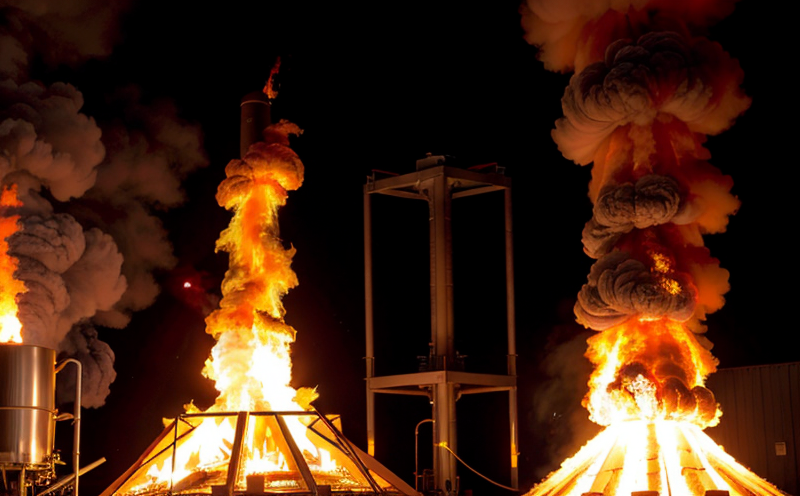Detergent Chemical Safety Testing
The detergent chemical safety testing service is critical in ensuring consumer and environmental safety. Detergents are widely used household products that come into frequent contact with skin, fabrics, and the environment. The rigorous testing of these products helps manufacturers comply with international standards while safeguarding public health.
Flammability tests are one aspect of this comprehensive service, assessing how easily a detergent can catch fire or ignite under specific conditions. This is particularly important for liquid detergents that may be used in various environments, including households where they can come into contact with flammable materials like fabric softeners or dryer sheets.
Chemical safety testing goes beyond just flammability tests. It involves evaluating the potential toxicity and irritation of a detergent on human skin and eyes. This includes identifying any hazardous chemicals that may be present in concentrations exceeding safe limits as defined by international standards such as ISO, ASTM, EN, IEC, etc.
The testing process begins with careful specimen preparation. Samples are taken from different batches to ensure that the results are representative of the entire production run. The samples undergo a series of tests using specialized equipment designed to mimic real-world conditions. For instance, flammability tests may involve placing the sample in an open flame or under controlled heat sources to observe its behavior.
Once testing is complete, detailed reports are generated summarizing all findings. These reports provide insights into the detergent's chemical composition, including any potentially harmful substances identified during analysis. Compliance officers and quality managers use these reports to make informed decisions about product modifications if necessary or to maintain compliance with regulatory requirements.
This service not only ensures that detergents meet legal standards but also helps enhance brand reputation by demonstrating a commitment to responsible manufacturing practices. By adhering strictly to international guidelines, companies can ensure their products are safe for use across different regions and cultures.
Industry Applications
The following table provides an overview of some key applications where detergent chemical safety testing is essential:
| Application Area | Description |
|---|---|
| Household Products | Detergents used in dishwashing, laundry washing, and other household cleaning tasks. |
| Industrial Cleaning | Detergents used in industrial settings for floor cleaning, equipment maintenance, etc. |
| Laundry Services | Detergents used by commercial laundries to clean large volumes of fabric. |
| Baby Care Products | Detergents formulated specifically for use on baby clothes and other items. |
| Automotive Cleaning | Detergents designed to remove dirt, grime, and grease from vehicles. |
Each application area presents unique challenges when it comes to ensuring the safety of the detergent. For example, in laundry services, there is a need to ensure that the detergent does not cause color fading or damage delicate fabrics.
In industrial cleaning applications, the detergent must be effective at removing tough stains while being safe for use around sensitive equipment and personnel. In baby care products, extra precautions are taken to avoid any potential irritation or toxicity issues.
International Acceptance and Recognition
Detergent chemical safety testing is recognized globally through various international standards such as ISO 8690, ASTM E1354, EN 71-3, IEC 62368. Compliance with these standards ensures that the detergent meets stringent quality control measures and regulatory requirements.
ISO 8690 specifies the general principles for evaluating the flammability of household detergents. ASTM E1354 provides guidelines on determining the flash point of non-aqueous solvents, which is crucial in assessing the potential fire hazard associated with certain types of detergent formulations.
EN 71-3 sets out requirements specifically for toys and similar products intended for use by children under 36 months. While primarily focused on toy safety, this standard also addresses issues related to chemical exposure from materials used in making these toys, including detergents.
IEC 62368 covers electrical equipment, but its principles can be applied to assess the safety of electronic devices that may come into contact with detergents during use. This includes ensuring that no harmful chemicals leach out onto surfaces where they could pose a risk to health or damage property.
By adhering to these international standards, manufacturers demonstrate their commitment to producing safe and reliable products. Regulatory bodies around the world recognize these standards and accept them as proof of compliance with local regulations.
Use Cases and Application Examples
In a real-world scenario, a manufacturer may need to test a new detergent formulation before launching it into market. The first step would involve preparing samples from several batches to ensure consistency across production runs. Once the samples are ready, flammability tests could be conducted using an open flame apparatus to determine how easily each batch catches fire.
Chemical safety testing might also reveal the presence of formaldehyde or other potentially harmful substances at levels exceeding permissible limits. If such issues were discovered, corrective actions would need to be taken before proceeding further with development and production processes.
An example from an industrial setting could involve testing a detergent designed for removing tough stains from carpets in commercial laundries. The test results would provide valuable data on its effectiveness while ensuring that it remains safe for use by staff operating the machines as well as customers bringing their items for cleaning.
For baby care products, the focus might be more on skin irritation tests rather than flammability or chemical safety alone. These tests help ensure that even infants can safely interact with the product without experiencing adverse reactions.





